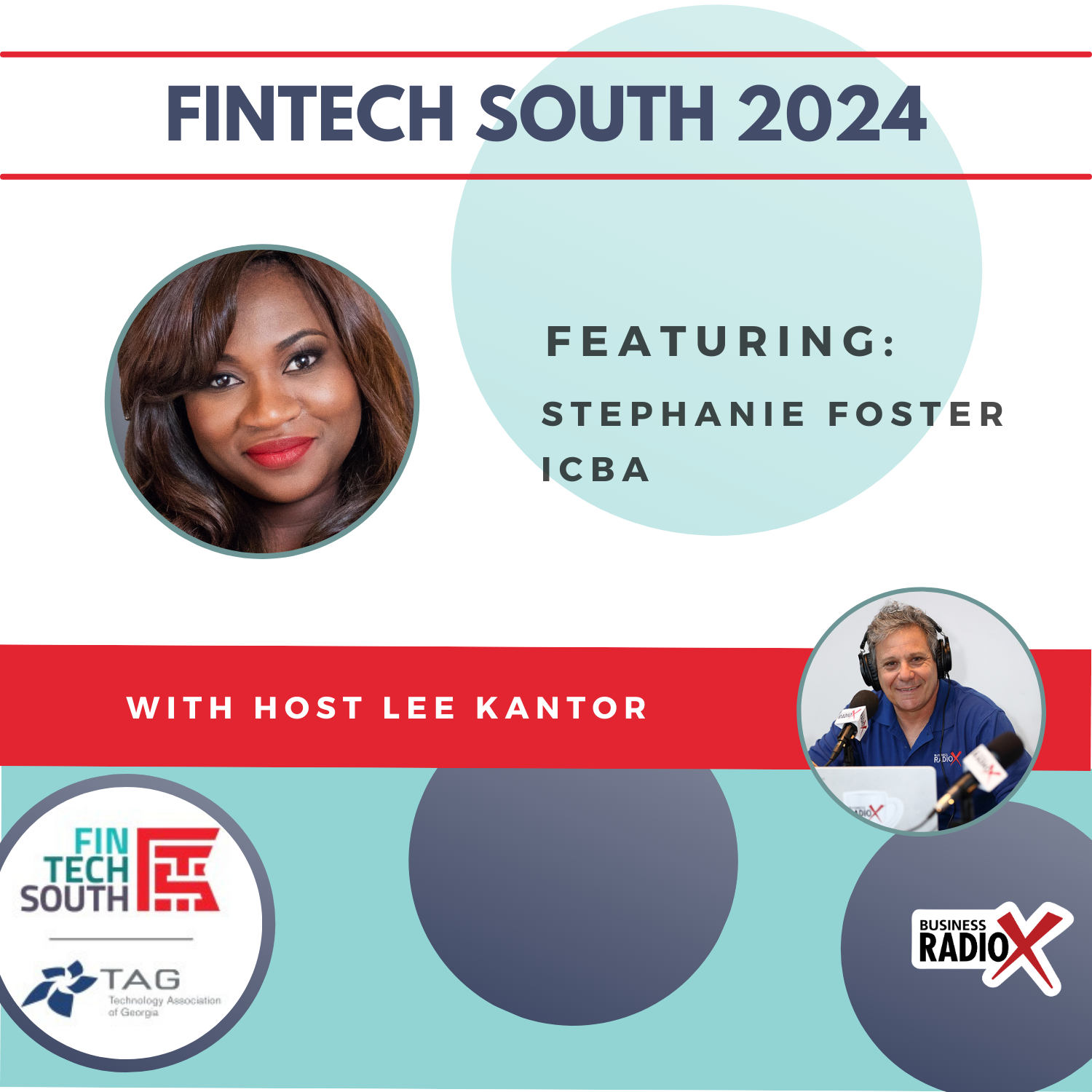

Fintech South 2024, hosted by the Technology Association of Georgia (TAG), took place on Aug. 27-28 at the Woodruff Arts Center and Atlanta Symphony Hall. This year’s theme was “Fintech Lives Here!”
 Stephanie Foster is Managing Director, ThinkTECH Accelerator for the Independent Community Bankers of America® (ICBA).
Stephanie Foster is Managing Director, ThinkTECH Accelerator for the Independent Community Bankers of America® (ICBA).
Foster is based in Atlanta and helps plan and execute the daily operations for ICBA’s ThinkTECH Accelerator programs, which will advance community bank-fintech partnerships through the development of targeted solutions for community banks.
Foster brings more than two decades of proven performance, managing over a dozen strategic partnerships and omni-channel products in peer-to-peer, business to business, and business-to-consumer platforms. She most recently served as chief administrative officer for XY Planning Network, an advisory service for Gen Y and Gen Z clients. Foster has also held management roles at Finastra, Fiserv and Western Union and was a founding board member for Women Driving Innovation at the Atlanta Innovation Forum.
Foster is a previous Electronic Transaction Association 40 Under 40 recipient, an annual award that celebrates gamechangers in the payments technology industry. In 2018, she was selected from a list of 500 international nominees to participate in Money 20/20’s inaugural Rise Up program, an exclusive cohort of 35 women leaders in the financial services ecosystem.
Foster is the co-host of One Vision: Fintech Fuse podcast where she interviews a diverse group of entrepreneurs, visionaries and thought leaders focused on stories with purpose. She also serves on the SouthEast Women in Fintech planning committee.
She holds a Bachelor of Science in marketing from Barry University and an Executive Master of Business Administration in international business from Florida Atlantic University.
![]() This transcript is machine transcribed by Sonix.
This transcript is machine transcribed by Sonix.
TRANSCRIPT
Intro: Broadcasting live from the Business RadioX studio in Atlanta, Georgia. It’s time for Atlanta Business Radio, brought to you by Kennesaw State University’s Executive MBA program, the accelerated degree program for working professionals looking to advance their career and enhance their leadership skills. And now, here’s your host.
Lee Kantor: Lee Kantor here. Broadcasting live from Fintech South 2024 at the Woodruff Arts Center. So excited to be talking to my next guest. Stephanie Foster, Managing Director for ICBA ThinkTECH Accelerator. Welcome.
Stephanie Foster: Thank you for having me.
Lee Kantor: Well, for folks who aren’t familiar, can you share a little bit about the ICBA?
Stephanie Foster: Sure. So ICBA stands for Independent Community Bankers of America. We are a trade association for community banks. We’ve been around since 1930, headquartered in Washington, D.C., and our mission is to create and promote an environment where community banks flourish. We’ve got over 400, over 4700 community banks that are members of our trade association. And really we have three main pillars that build up our association. One of them is advocacy. So we advocate on behalf of all community banks whether or not they’re a member. Education is our second pillar and innovation is our third pillar. And that’s who I represent today.
Lee Kantor: Now, um, can you can you help the listener understand maybe the difference between a community bank and maybe one of those stadium banks? We do not.
Stephanie Foster: Say those names out loud.
Lee Kantor: I said stadium banks.
Stephanie Foster: Yeah, sure. So, you know, we always say the community banks are like snowflakes. They’re all unique and different. But your typical community bank, you know, is it focuses on their local community. A lot of them are still very much run by, you know, their fifth generation banker that was raised to lead the bank, collect deposits from the local community and reinvest those funds via loans to help support local businesses. You know, one way to describe community banks is that it’s all about relationship banking. It’s about developing a relationship with the local community. You know, it’s somebody that, you know, like you watch this kid grow up. Your bank was sponsoring the local T-ball team, and now they’ve opening up their own business. You know, their mom and dad. You’ve established over time that is what community banking is.
Lee Kantor: Yeah. And I think that it’s so important that people appreciate that because a lot of times they default to the bank that, you know, maybe they’ve heard of more, but the community bank is typically that person, like you said, in the community that’s going to make a loan in the community, the money is going to go back to the business owner that’s in the community. Like it’s very a kind of a righteous circle with everybody is really trying to help each other They’re locally.
Stephanie Foster: Exactly.
Lee Kantor: So now you’re the managing director for the Think Tech Accelerator. Can you talk about that initiative? Because that sounds pretty exciting.
Stephanie Foster: Yeah, of course I would love to. So six years ago, the Icba started this accelerator program. And really it was a vision of our leadership at the time to encourage our member banks to start thinking differently. Right. Thinking differently about different ways that they can grow their bank to become more competitive, more efficient and more profitable. Right. And it’s it’s hard to do that in this day and age without being innovative and looking at different ways of doing the same thing. So we put together this accelerator program essentially to help connect fintechs with our member banks. It’s a ten week program that we run every year. Um, we recruit companies across the US and even globally as well. North of the border. We have several companies from Canada actually, that have participated in our program in the past as well. But in the last six years, we’ve had over 50 different fintechs that have participated in this program, and they are solving problems for community banks, from compliance to deposits fraud. We’ve got some AI companies also come through. So it’s been a great way to support our our member banks and presenting new and evolving technology to them.
Lee Kantor: Now are the banks contacting the startups and saying, hey, we have this challenge, or the startups contacting the banks and saying we have the solution.
Stephanie Foster: I would say it’s a combination of both. What we do to our program, actually, we serve as the middleman, right? So we have this ten week program during which we are actively navigating and kind of owning that relationship and helping not only educate the fintechs to learn more about community banking, what it is, how it works, what are some of the problems that our banks are typically dealing with or what’s the most urgent need today? And we bring the banks to the table to come over three and a half period of hours on zoom, and they get to hear each company come in. They pitch for 15 minutes. The banks get to ask them questions for about ten minutes. We do a survey at the end and all that feedback goes back to the fintech. So it’s a great opportunity for the fintechs to get exposure to the banks, conduct customer discovery, and the banks in return are being exposed to the latest and greatest technology.
Lee Kantor: Now, is this happening locally or is this happening kind of for the community as a whole?
Stephanie Foster: Really good question. Our program is actually hybrid. So it’s ten weeks. Three weeks are in person and seven weeks are fully hybrid on zoom. So we’re able to access bankers from across the nation to participate the three weeks in person. Typically two weeks happen here in Atlanta. We have an office actually right down the street here from Woodruff Arts Center at 999 Peachtree, um, where we have the six fintechs come in for a week. We have bankers from all over as well that come in to spend time with the fintechs, learn about what they’re doing, provide feedback on the solution, and help them essentially to organize their value proposition to to banks. And then we have the hybrid version on zoom as well.
Lee Kantor: So what do you need more of? How can we help you?
Stephanie Foster: Thank you for asking. I am in recruiting season right now, so I am actively looking for fintechs to participate in our program. If anybody is interested, we look for growth stage companies between Seed and series A that are solving problems for community banks. This could be anything from AI compliance deposits, any regulatory tool fraud. For example, if you are interested you can check out our website wikborg or you can send me an email Stephanie Foster at wikborg. If you are interested in learning about the accelerator program.
Lee Kantor: Well, you came to the right place. You meet anybody interesting here at Fintech South?
Stephanie Foster: I met tons of folks yesterday actually, and I was a judge at the Innovation Challenge on stage. So yeah, I’ve got my recruiting hat on and I’m excited to walk away with a full list of recruits for my next program.
Lee Kantor: So how does the fintech scene here in Atlanta compare to other areas that you kind of work with?
Stephanie Foster: Fintech is hot in Atlanta. That’s why we’re here at Fintech South, obviously. But yeah, we actually have gotten several companies that are local from Atlanta that have participated in our program before. One of them is moment here locally moment. They were on stage with us yesterday as well, and they were one of the finalists for the Advance Awards. There’s another local company here, trust that, another Atlanta based company that participated in our accelerator program last year. So we’ve got a pretty strong Atlanta cohort, too.
Lee Kantor: Well, thank you so much for sharing your story today. You’re doing such important work and we appreciate you.
Stephanie Foster: Thank you for having me. It was a pleasure.
Lee Kantor: All right. This is Lee Kantor. We’ll be back in a few. At Fintech South 2024.














